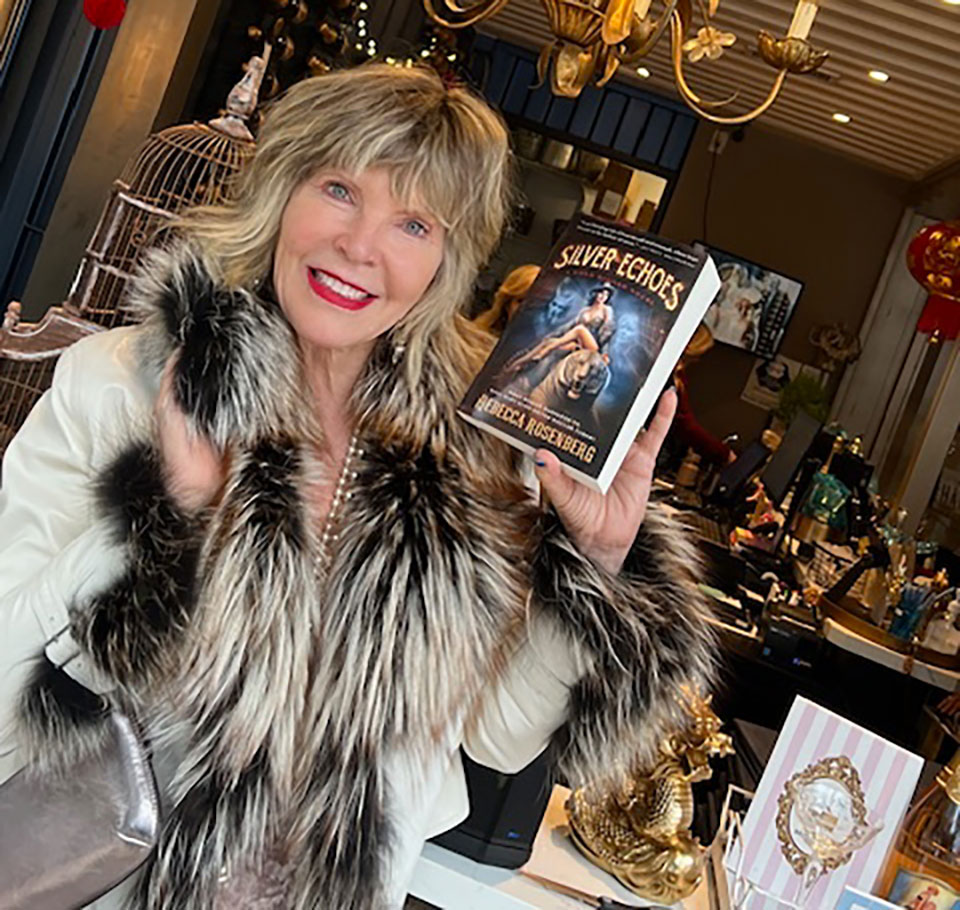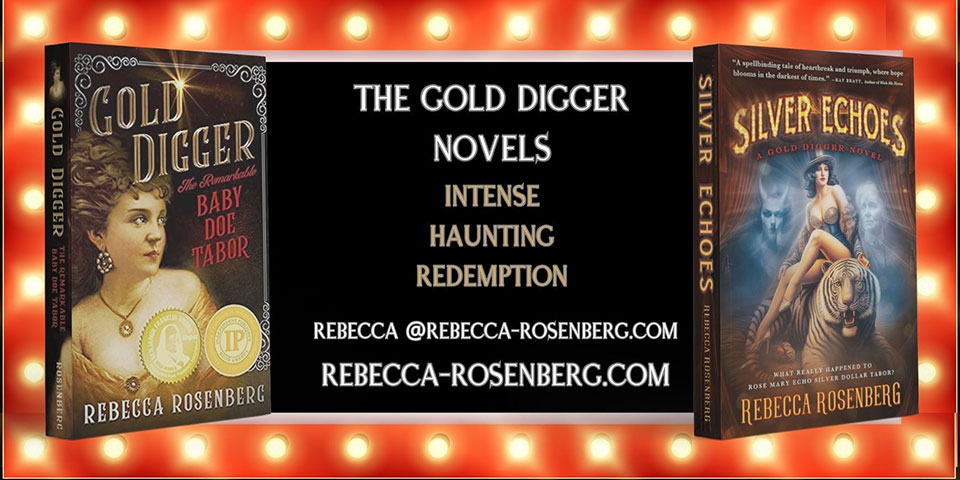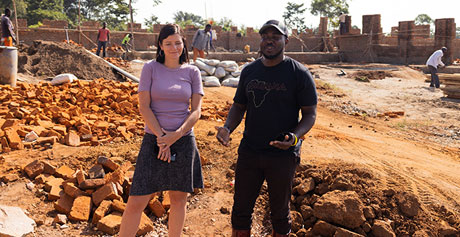Rebecca Rosenberg is an AwardWinning Historical Novelist Known for Bringing to Life the Fascinating Stories of Real Women Who Made Their Mark on History.

Q: Rebecca, your childhood in Colorado, filled with exploring ghost towns, old mines, and even reading gravestones, sounds like a truly unique upbringing. How did those early experiences connect you to the spirit of history, and ultimately lead you to become a novelist specializing in historical women?
RR: You forgot the honky-tonk bars with roasted peanuts; their shells scattered across the floor! All those sounds, smells, and feelings whispered through the air: whistling winds, rainbow trout leaping from mountain streams, steam billowing from narrow-gauge trains, the heavy scent of the saloon, the creak of old floors, the faded photographs … each detail seemed to hum with the vibrant, exciting lives of people who once filled these theaters, mansions, saloons, and churches. I listened intently to the old-timers' stories in the mountain towns, and the saga of Baby Doe Tabor’s struggles and triumphs gripped me, refusing to let go. Then there was the unsolved mystery of her daughter, Silver Dollar Tabor. I had to dive into their diaries and letters, compelled to find out more—as if they were truly reaching out from the grave to tell their astounding stories.
Q: You've expanded your focus to women across history and continents, including the captivating Champagne Widows like Barbe-Nicole Clicquot and Madame Pommery. What common threads do you find connect these diverse historical women to your own experiences and observations as a woman navigating today's world?
RR: When I delve into the lives of women like Barbe-Nicole Clicquot, Madame Pommery, or Lily Bollinger, the common threads are strikingly clear and resonate deeply with my own experiences as a woman today.
Ambition: These women weren't content to simply accept the limitations placed upon them. Barbe-Nicole, widowed at 27, could have retreated, but instead, she took the reins of a struggling business and transformed it into an empire. Madame Pommery dared to revolutionize champagne, creating the dry brut style when only sweet was known. That same drive to innovate, build, and make a mark, despite societal expectations, is something I see in so many women, including myself, striving to create their own paths. Their stories are a powerful reminder to push boundaries.
Resilience: These women faced immense personal tragedies, wars, economic downturns, and direct opposition simply because of their gender. Barbe-Nicole navigated the Napoleonic Wars, while Madame Pommery endured the Franco-Prussian War, even hiding her precious champagne in secret caves. Their ability to adapt, persevere through unimaginable adversity, and rebuild after setbacks is truly inspiring. In today's world, the need for resilience—to bounce back from criticism, navigate professional hurdles, or juggle demanding roles—is just as vital. Their stories remind me that setbacks are often just setups for comebacks.
Defiance: By simply existing and succeeding in their chosen fields, these women performed acts of defiance. They broke norms, challenged traditions, and proved women were capable of far more than society allowed. Barbe-Nicole's decision to remain a widow and manage her business, rather than remarrying and ceding control, was a profound act of defiance against the Napoleonic Code. Madame Pommery’s insistence on a brut champagne was also a defiant act against established tastes. This quiet or not-so-quiet refusal to be confined by expectations connects them to the ongoing fight for gender equality and breaking glass ceilings that women still face today. Their lives are a testament to the power of a woman saying, "I will do it my way."
Ultimately, these women, despite living centuries ago, faced many of the same core human struggles and triumphs that we do. Their stories aren't just history; they're echoes of a spirit that continues to inspire and empower women to pursue their ambitions, find their resilience, and defiantly carve out their own legacies in a world that still needs to hear their voices.
Q: America's Women Magazine celebrates the strength and spirit of women. What personal qualities do you believe are essential for any woman striving to make her mark, whether she's a 19th-century champagne entrepreneur, a Colorado mining heiress, or a contemporary professional?
RR: Building on what I've learned from historical figures and observed in women today, several personal qualities are absolutely essential for any woman striving to make her mark, regardless of the era or profession.
Beyond the ambition, resilience, and defiance we just discussed, a crucial quality is vision. These women didn't just react to their circumstances; they envisioned a different future and then worked relentlessly to bring it to fruition. Barbe-Nicole didn't just sell wine; she saw a global market and the potential of champagne itself. Baby Doe Tabor, the Colorado mining heiress, while navigating her own complex life, was part of a dynamic, forward-thinking era. A contemporary professional needs that same ability to look beyond the immediate and chart a course toward a bigger goal.
Another vital trait is adaptability. The world is constantly changing, and making your mark requires the ability to pivot, learn new skills, and embrace unexpected challenges. The Champagne Widows faced political upheaval and economic shifts, and they survived and thrived because they could adapt their strategies. Today's professional landscape demands constant learning and the flexibility to adjust to new technologies and market demands.
Finally, a deep sense of self-belief is paramount. These women operated in environments that often doubted their capabilities or tried to limit their influence. To stand firm, innovate, and lead, they had to possess an unwavering conviction in their own ideas and abilities. This isn't arrogance, but a quiet strength that allows one to push forward despite external skepticism. Whether it's a 19th-century entrepreneur or a woman leading a tech startup, believing in yourself is the foundation from which all other successes spring. Without it, the ambition might wane, resilience might crumble, and defiance might falter. It's the inner compass that guides them to leave their unique mark on the world.
Q: Your novels often showcase women who, despite societal constraints, found ways to wield influence and power. As a novelist bringing these stories forward, what message about female agency and determination do you hope resonates most with your readers?
RR: The message I most hope resonates with my readers about female agency and determination is this:
Power isn't always found where you expect it. Many of the women I write about—whether they're commanding a champagne empire, navigating the complex world of mining fortunes, or simply trying to survive a challenging era—weren't operating in a world that handed them traditional power. They didn't have the vote, they couldn't always own property, and their voices were often silenced. Yet, they found ways to wield immense influence.
I want readers to see that agency isn't just about grand gestures or holding an official title. It's about resourcefulness, intellect, and an unwavering will to survive and thrive. It's about using the tools at hand—be it social networks, business acumen, subtle manipulation, or sheer stubbornness—to carve out a space for themselves and impact their world. Barbe-Nicole Clicquot, for instance, used her sharp business mind and an almost audacious marketing vision to create a global brand from scratch, despite incredible odds. She defined her own power through commerce and innovation.
My hope is that readers, especially women, look at these historical figures and recognize that same spirit within themselves. You don't have to be queen, a CEO, or a public figure to have agency. Every woman has the capacity for determination, to shape her own destiny, to overcome obstacles, and to influence her surroundings, even if it's in ways that aren't immediately obvious or celebrated. It's about finding and exercising your personal power, no matter the constraints, and never underestimating the impact of a determined spirit. These stories are a testament that true strength comes from within, and it can manifest in countless powerful ways.

Q: For women who feel a passion for history or untold stories, but might feel daunted by the idea of writing a novel, what's one piece of advice you'd offer from your own writing journey – perhaps something you wish you'd known when you first started?
RR: Start by outlining the story you want to tell and identifying the key structural scenes in the book.
When you think of "writing a novel," it can feel like climbing Mount Everest. The plot, the characters, the arc, the pacing, the thousands of words, it's overwhelming. Instead, focus on creating that initial blueprint. Outline the major plot points, develop your characters, and map out those pivotal, structural scenes.
What you'll find is that by creating this framework, you're not just practicing your craft; you're ensuring the whole story makes sense in the end. It prevents you from getting lost along the way with parts that don't matter, keeping your narrative tight and focused. You're essentially "constructing" the novel with a clear roadmap, rather than trying to discover it haphazardly. This approach makes the process far less daunting and far more enjoyable, allowing your passion for history to naturally lead you toward telling those untold stories effectively.
Q: What is one word of advice you can offer to young women who want to reach your level of success?
RR: Perseverance. Keep trying new things, repeat the things that work. Toss things that don’t.
Q: Can you tell our audience one of your most memorable moments of your career?
RR: Too many moments to count. From an IBPA gold medal award to the first review on every book. I take pleasure and motivation from in all those successes, big and small.
Q: What advice would you give to young women who want to pursue their dream and start a business?
RR: Make sure your dream is worth your blood, sweat and tears! Do your homework on the market. Study the market and how your product or service fits their needs. I founded Sonoma Lavender Company manufacturing lavender products with my husband. Sounds very homemade and small, right? I felt strongly that lavender could be used in a myriad of beneficial ways, and we built the company to have 5000 retail stores, spas and resorts as customers.
Q: Can you tell us how you manage your work life balance?
RR: I’ve always worked and had a family at the same time. I find ways to get support or shortcut housekeeping tasks. Right now, I order ready-made meals several times a week. And I let go the things that don’t really have to be done now. I wrote this interview rather than weeding in the garden. (Those weeds will be there when I’m done.)
Q: What's your advice for women in male-dominated fields?
RR: Find a woman mentor in your field! Join clubs and associations of like-minded women in your field.
Ten Things About Rebecca Rosenberg
1. If you could share a meal with any 4 individuals, living or dead, who would they be?
I would dearly love to dine with the Champagne Widows: Madame’s Clicquot, Pommery, Bollinger and Roederer.
2. What's your favorite family tradition?
Sunday morning walks with our dogs around a lake.
3. What’s your favorite thing to do in your free time?
We love to travel. Headed out for another Champagne Trip tomorrow! Purely research, mind you.
4. Among your friends, what are you best known for?
My love of all things Champagne
5.What’s your favorite international drink?
Champagne
6. What would your perfect vacation look like?
Champagne region of France
7. Favorite Dessert?
Champagne
8. Tell me about the best vacation you’ve ever taken.
Champagne region of France
9. What’s your big passion?
Champagne.
10.What’s your signature drink?
Do I really have to say it?

